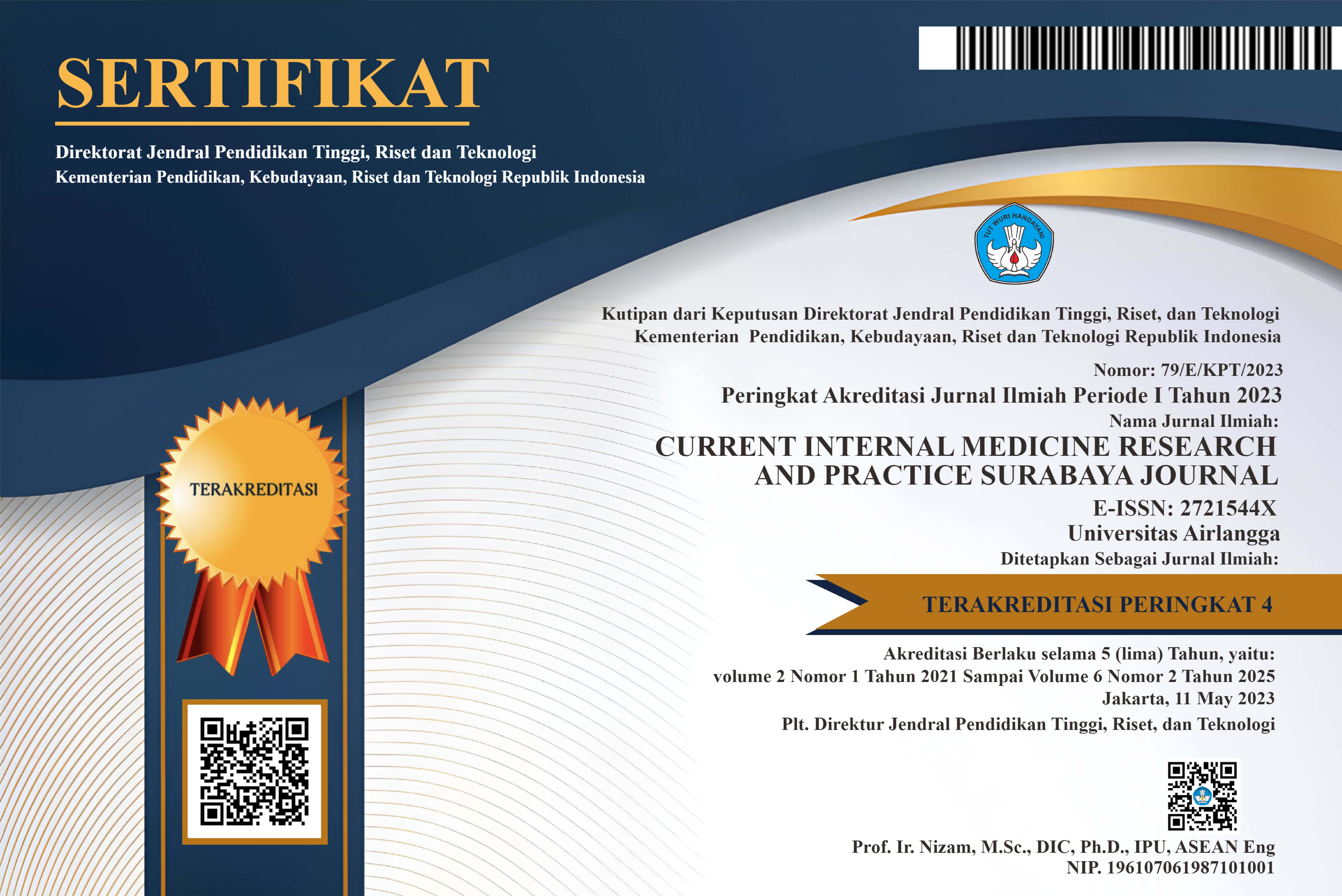Omega-3 Polyunsaturate Fatty Acid Supplementation Potential to Improve Activity Components of Rheumatoid Arthritis: A Systematic Review
Downloads
Introduction: Rheumatoid arthritis (RA) is a chronic disease that causes deformity in most productive age and can lead to death as disease activity increases. Omega-3 polyunsaturated fatty acids have the potential to complement available therapies in reducing disease activity. Currently, the effect of omega-3 PUFAs on disease activity components is still unclear. The current systematic reviews determine the effect of omega-3 PUFAs' supplementation on the components of RA disease activity.
Methods: This research is guided by the PRISMA guidelines systematically. Literature was searched in the databases: PubMed, MDPI, and Clinicaltrials.gov. The inclusion criteria used were: giving omega-3 PUFAs, free full-text, RCT, in English or Indonesian, assessing disease activity and its components; while the exclusion criteria were: unpublished, comparisons were inappropriate. Assessment of literature quality with the Cochrane Collaboration's tool. The study included six studies from 1994 to 2017.
Results: The effect of omega-3 PUFAs is diversity in changes of disease activity in 4 of 5 studies. There are significant reductions in the number of joint pains in the literature by daily doses above 2.9 grams or at lower doses taking longer; and swollen joints in 2 studies that were only affected in doses above 2.9 grams. There are significant reductions in pain severity in the studies. Change increases with higher doses. There are variable LED and CRP changes.
Conclusion: Depending on their dose and administration duration, omega-3 PUFAs can directly and indirectly affect disease activity through the influence of most of its components, namely: the number of joints affected and the degree of pain.
Abbas, A. K., Lichtman, A. H. H. and Pillai, S. (2018) ‘Cellular and Molecular Immunology, 9e', Philadelphia, PA: Elsevier Saunders.
Akintoye, E. et al. (2018) ‘Fish Oil and Perioperative Bleeding', Circulation: Cardiovascular Quality and Outcomes. Lippincott Williams & WilkinsHagerstown, MD, 11(11), p. e004584. doi: 10.1161/CIRCOUTCOMES.118.004584.
Calder, P. C. (2010) ‘Omega-3 Fatty Acids and Inflammatory Processes', Nutrients 2010, Vol. 2, Pages 355-374. Molecular Diversity Preservation International, 2(3), pp. 355–374. doi: 10.3390/NU2030355.
Dawczynski, C. et al. (2009) ‘Long-term moderate intervention with n-3 long-chain PUFA-supplemented dairy products: Effects on pathophysiological biomarkers in patients with rheumatoid arthritis', British Journal of Nutrition, 101(10), pp. 1517–1526. doi: 10.1017/S0007114508076216.
Dawczynski, C. et al. (2011) ‘Incorporation of n-3 PUFA and γ-linolenic acid in blood lipids and red blood cell lipids together with their influence on disease activity in patients with chronic inflammatory arthritis - A randomized controlled human intervention trial', Lipids in Health and Disease. BioMed Central Ltd, 10(1), p. 130. doi: 10.1186/1476-511X-10-130.
Geusens, P. et al. (1994) ‘Long"term effect of omega"3 fatty acid supplementation in active rheumatoid arthritis', Arthritis & Rheumatism, 37(6), pp. 824–829. doi: 10.1002/art.1780370608.
Goldberg, R. J. and Katz, J. (2007) ‘A meta-analysis of the analgesic effects of omega-3 polyunsaturated fatty acid supplementation for inflammatory joint pain', Pain. Elsevier, 129(1–2), pp. 210–223.
Lin, Y.-J., Anzaghe, M. and Schülke, S. (2020) ‘Update on the Pathomechanism, Diagnosis, and Treatment Options for Rheumatoid Arthritis', Cells. MDPI AG, 9(4), p. 880. doi: 10.3390/cells9040880.
Lourdudoss, C. et al. (2018) ‘Dietary Intake of Polyunsaturated Fatty Acids and Pain in Spite of Inflammatory Control Among Methotrexate-Treated Early Rheumatoid Arthritis Patients', Arthritis Care & Research. John Wiley & Sons, Ltd, 70(2), pp. 205–212. doi: 10.1002/ACR.23245.
Miles, E. A. and Calder, P. C. (2012) ‘Influence of marine n-3 polyunsaturated fatty acids on immune function and a systematic review of their effects on clinical outcomes in rheumatoid arthritis, British Journal of Nutrition. Cambridge University Press, 107(S2), pp. S171–S184. doi: 10.1017/S0007114512001560.
Nelson, J. et al. (2020) ‘Do interventions with diet or dietary supplements reduce the disease activity score in rheumatoid arthritis? A systematic review of randomized controlled trials', Nutrients. Multidisciplinary Digital Publishing Institute (MDPI), 12(10), pp. 1–23. doi: 10.3390/nu12102991.
Rajaei, E. et al. (2015) ‘The Effect of Omega-3 Fatty Acids in Patients with Active Rheumatoid Arthritis Receiving DMARDs Therapy: Double-Blind Randomized Controlled Trial', Global journal of health science, 8(7), pp. 18–25. doi: 10.5539/gjhs.v8n7p18.
Reed, G. W. et al. (2014) ‘Treatment of rheumatoid arthritis with marine and botanical oils: An 18-month, randomized, and double-blind trial', Evidence-based Complementary and Alternative Medicine, 2014. doi: 10.1155/2014/857456.
Veselinovic, M. et al. (2017) ‘Clinical benefits of n-3 PUFA and ɤ-linolenic acid in patients with rheumatoid arthritis', Nutrients, 9(4). doi: 10.3390/nu9040325.
WHO (2021) WHO | Chronic rheumatic conditions. Available at: https://www.who.int/chp/topics/rheumatic/en/ (Accessed: 23 March 2021).
Copyright (c) 2023 Current Internal Medicine Research and Practice Surabaya Journal

This work is licensed under a Creative Commons Attribution-ShareAlike 4.0 International License.
Copyright (c) Author
1. The journal allows the author to hold the copyright of the article without restrictions.
2. The journal allows the author(s) to retain publishing rights without restrictions.
3. The formal legal aspect of journal publication accessibility refers to Creative Commons Atribution-Share Alike 4.0 (CC BY-SA).






















